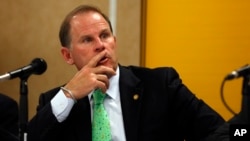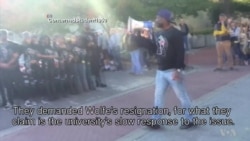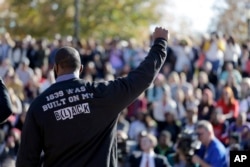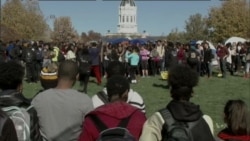The president of the University of Missouri and the chancellor of the flagship campus each announced Monday they are resigning their positions, giving in to a key demand of student protesters who said the leadership did not adequately deal with repeated instances of racial and other discrimination on campus.
Tim Wolfe, the school system’s president, made his emotional announcement at a meeting of the school's governing body at the main campus of the 35,000-student university in the central state of Missouri.
“I take full responsibility for this frustration and I take full responsibility for the inaction that has occurred,” said Wolfe, who also called on students to use his resignation “to heal and start talking again.”
The issue attracted nationwide attention after the student government joined some faculty members and players on the school's football team in calling for Wolfe's ouster. Some teachers and students had threatened to walk out over the matter.
University Chancellor Bowen Lofton said he would move on to a new role on the Columbia campus dealing with research.
WATCH: video of protesters at university
Student-led protests
Greg Carr, chair of the Department of Afro-American Studies at Howard University in Washington, D.C., said students have been at the forefront of the U.S. civil rights movement since the mid-20th century.
“Most of the progress we’ve made in human rights and civil rights in this country have been though movements that were student led,” he said.
“These young people are talking to each other and I think we see an X factor that we didn’t have to factor in 50 years ago and sometimes real-time change — while unpredictable — real-time change is more possible now than it was 50 years ago. I don’t know that the president of the University of Missouri would be resigning today if were not for the impact of social media and the front-door seat that the world has to these events while they’re unfolding.”
Many students at the overwhelmingly white campus are upset at racial slurs directed at some black students in recent weeks and a swastika drawn in human waste found in a dormitory bathroom.
Since then, a diverse array of student groups has joined the protest movement, speaking out against alleged acts of discrimination against other racial and sexual minority groups. Others have been calling for the school to reverse cutbacks to graduate student benefits.
The protesters, however, appeared to be primarily motivated by racial issues.
Economic muscle
A black graduate student, Jonathan Butler, started a hunger strike a week ago in protest, an action that has drawn increasing support on campus, including from 30 black football players who said they would not participate in any team related activities unless Wolfe quit or was fired. After Wolfe resigned, Butler said he ended his hunger strike.
The school's head football coach, Gary Pinkel, expressed solidarity with his player's decision to not play, a threat that if acted on, would have cost the school more than $1 million from next Saturday’s game.
Carr noted that the students wisely applied some powerful leverage to get action.
“So when you see the potential of student athletes, student athletes saying they won’t perform on athletic fields, this has a profound economic implication — you’re talking about millions of dollars — it also has a profound cultural implication because again what these students are in some ways — what these students are announcing is that they’re not just athletes, they are student athletes and their concerns are the same concerns as other students,” he said.
Watch video report from VOA's Zlatica Hoke:
Jeremy Neely, an instructor of history at Missouri State University in Springfield, said one of the most encouraging parts of the student movement is the political assertiveness of the football team that was willing to speak up and take a stand against a climate of intolerance.
“It’s the second time in the past couple of years that the University of Missouri football team has become socially relevant on a national scale, because it was in 2013 that their teammate Michael Sam became the first college football player to come out. And he was supported by teammates, and I think that was remarkable," he said. "So this isn’t the first time that the football team has come out and taken a position to distinguish themselves from the university.”
Lofton said before Butler’s hunger strike began, the school had created a Vice Chancellor for Inclusion, Diversity and Equity, planned required diversity training for all incoming students, committed to a campus climate survey, and mandated search committees to complete training aimed at diverse and inclusive hiring — all with Wolfe’s support and endorsement.
The controversy comes amid ongoing nationwide racial tensions surrounding instances of police violence against unarmed black men. The University of Missouri is about 200 kilometers from where 18-year-old Michael Brown was shot after a confrontation with a white police officer in the St. Louis suburb of Ferguson in 2014. Investigators ultimately determined the shooting was justified and the police officer was not charged.









